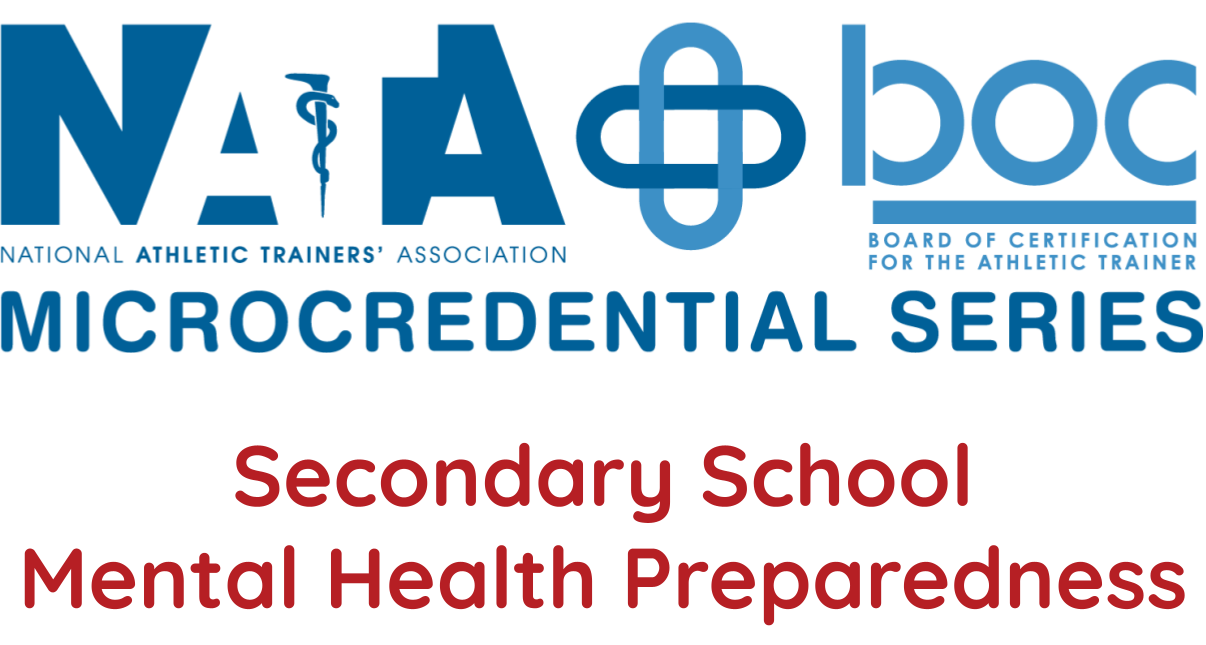
Module 2 - Understanding Student-Athlete Mental Health: Essential Knowledge for Athletic Trainers
| Secondary School Athlete Mental Health |
Abstract:
Athlete mental health is increasingly important within sports medicine. Athletic trainers are often the first point of contact for athletes experiencing mental health difficulties (Neal et al., 2013; NCAA Research, 2021) during and independent of injury rehabilitation (Arvinen-Barrow & Clement, 2017). Although athletic trainers are responding to these emotional experiences, not all athletic trainers feel equipped to provide psychological assistance (Clement & Arvinen-Borrow, 2019; Young et al., 2020. Moreover, many sports medicine teams do not have mental health providers with expertise in working with athletes in their departments (Sudano et al., 2017). Therefore, athletic trainers would benefit from education regarding how to identify and refer athletes experiencing mental health difficulties to qualified mental health providers, specifically as it relates to mental health emergencies (Ostrowski et al., 2023). This course is designed to assist athletic trainers in their knowledge and awareness of mental health concerns so they can effectively refer a secondary school athlete experiencing difficulty to qualified health professionals (Haggerty et al., 2018).
Learning Objectives:
- Identify mental health concerns of secondary school student-athletes.
- Understand risk & protective factors for mental health concerns.
- Apply knowledge to empower the athletic trainer in navigating mental health concerns.
| Addressing Psychological Concerns to Practice Whole-Person Health Care |
Abstract:
Athletic trainers increasingly recognize the critical intersection between physical injury and psychological well-being. This perspective piece explores the expanding understanding of mental health within sports medicine, emphasizing the need for comprehensive patient care that addresses both physical and psychological dimensions of injury. Drawing from emerging research on sport-related injuries, particularly concussions, the article highlights the potential psychological impacts such as depression, anxiety, and identity disruption. The author discusses recent interassociation recommendations for identifying and referring student-athletes with psychological concerns, underscoring the importance of a holistic approach to athlete health. By advocating for collaborative care models and enhanced psychological screening, the piece calls for athletic trainers to broaden their professional practice beyond traditional physical rehabilitation to include mental health considerations. The narrative ultimately supports a whole-person health care approach that acknowledges the complex psychological experiences accompanying athletic injuries.
Learning Objectives:
- Explain the importance of integrating physical, mental, and emotional well-being into athletic training practices.
- Identify common psychological conditions that may result from sports injuries and their potential effects on athletes' overall health.
- Analyze risk factors that may influence psychological recovery and overall well-being in athletes.
- Discuss effective methods for gathering psychosocial history during preparticipation examinations and other assessments to better support athletes.
Course Level:
Essential
Course Domain(s):
Domain 1: Risk Reduction Wellness and Health Literacy
Domain 2: Assessment Evaluation and Diagnosis
Domain 3: Critical Incident Management
Domain 4: Therapeutic Intervention
Domain 5: Health Care Administration and Professional Responsibility
Keywords:
Mental health, secondary school, well-being
Course Expiration:
This premium course offering must be completed within 12 months from the purchase date.
For full details, refer to the expiration policy on our FAQ page.
Erin Haugen, PhD, LP, CMPC
Dr. Erin N. J. Haugen, PhD, LP, CMPC, is a licensed psychologist and certified mental performance consultant based in Grand Forks, ND. She is currently employed at Assessment and Therapy Associates of Grand Forks, PLLC (ATAGF), where she provides a range of mental health and performance psychology services to athletes at various competitive levels. Dr. Haugen is also the founder and CEO of Haugen Performance Consulting, PLLC, through which she offers performance psychology consultations, online training modules, and continuing education courses for athletes and professionals in the sports domain. Additionally, she serves as the Director of Mental Health & Performance Psychology for the University of North Dakota Department of Sports Medicine/Athletics, and as a Consulting Sport Psychologist for the University of Minnesota, Crookston.

